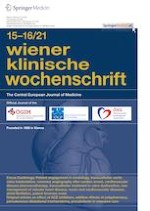06.10.2020 | original article
Utility of procalcitonin in a medical intensive care unit in Croatia
Erschienen in: Wiener klinische Wochenschrift | Ausgabe 15-16/2021
Einloggen, um Zugang zu erhaltenSummary
Aims
To investigate the clinical benefit of routine procalcitonin (PCT) measurement in the medical intensive care unit (ICU) of a tertiary referral hospital.
Methods
Adult patients with suspected infections were included. White blood cells, C‑reactive protein (CRP), and PCT were measured.
Results
In this study 129 patients of median age 64 years (interquartile range 39–89 years) were prospectively included. The Acute Physiology And Chronic Health Evaluation II (APACHE II) and Sequential Organ Failure Assessment (SOFA) scores were 21 ± 14 and 7 ± 6, respectively. Intensive care unit (ICU) mortality was 22.5%. Immunocompromised patients constituted 39.5%. A significant correlation was observed between PCT and APACHE II (Spearman’s rho 0.461, p < 0.01), PCT and SOFA (Spearman’s rho 0.494, p < 0.01) and PCT and CRP (Spearman’s rho 0.403, p < 0.01). Most patients (n = 83, 64.3%) received antibiotics before admission. No difference in PCT (1.56 ± 8 µg/L vs. 1.44 ± 13 µg/L, p = 0.6) was observed with respect to previous antibiotic therapy. Levels of PCT and CRP were significantly increased in patients with positive blood cultures, the infection caused by Gram-negative microorganism regardless of disease severity and pneumonia with complications. PCT did not differ among patients with positive vs negative urine culture (4.6 ± 16 µg/L vs. 1.76 ± 11.9 µg/L) or positive vs. negative endotracheal aspirate (1.93 ± 11.4 µg/L vs. 1.76 ± 1.11 µg/L). PCT-guided stewardship was applied in 36 patients (28%).
Conclusion
Increased initial PCT levels might point to the development of more severe disease caused by Gram-negative bacteria, regardless of previous antibiotic treatment. The results pertain to immunocompetent and immunocompromised patients. Implementation of PCT-guided stewardship in those patients is possible and relies on experience as well as knowledge of reference change value for a marker within the specific setting.
Anzeige
